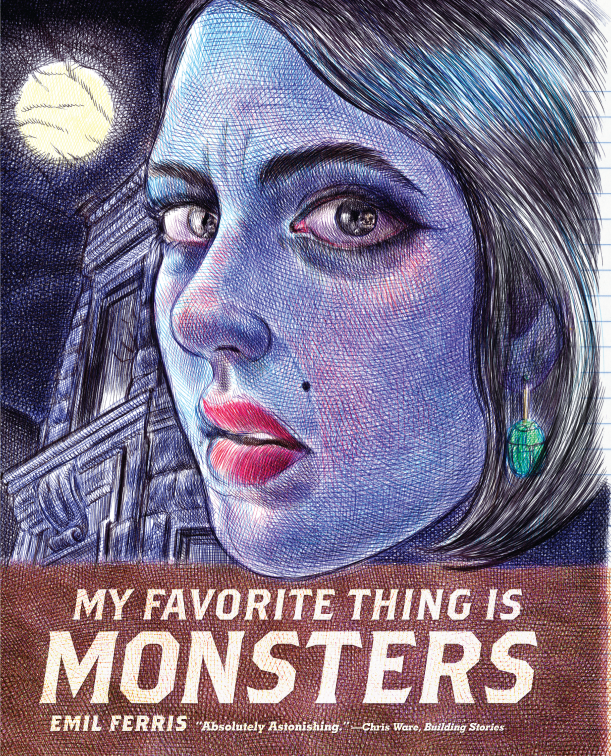Happy New Year, and sorry for the delay. We had our traditional beginning-of-the-year tech issues, but things are now working again, and we have one of the most enjoyable posts of the year: a wide-ranging collection of best-of lists from many of the comics world's finest thinkers and makers, the Best Comics of 2017.
Meanwhile, elsewhere:
—Reviews & Commentary. Austin Lanari was unimpressed by The Nib's farewell to 2017.
These comics are preloaded to be up their own asses. When it says "saying goodbye to 2017," given the tone and fairly constant POV of the majority of things on the site this year (nevermind the title of the column itself), I know when it says "goodbye to 2017" it doesn't mean qua calendar year. It means a personified 2017. 2017 the meme, the villain, that "took" from us and "gave" us Trump and what-have-you. As a thesis, this is immature, fit-for-twitter grandstanding that only serves to ensconce the material itself in meme-dom. It wears its irrelevancy on its sleeve and hardly makes for lasting or interesting art.
At The New Yorker, Peter Schjeldahl writes a new show featuring Käthe Kollwitz and Sue Coe.
As rendered by [Coe], rich men are beasts, cops are murderers, and butchers earn their name. She frankly traces her animus to a harrowing childhood, lived within earshot of a pig abattoir where, as she wrote in her book “Dead Meat” (1996), “slaughtering started at 4 a.m.” Her early friends included “radical lesbians who joined the marines, professional car thieves, drug addicts who died, a rock star, and one shorthand typist.” (She is a crackerjack writer.) A scholarship to the Chelsea School of Art, in London, when she was seventeen, delivered her from what she had assumed would be a working-class life. She studied illustration and, after moving to New York, in 1972, became a regular contributor to publications including the Times. The St. Etienne brochure aptly lists, as formative influences on her, “Daumier, Dix, Goya, Grosz and, of course, Kollwitz.” Debts to them all are apparent in her art, but only Otto Dix’s work really anticipates its ferocity.
At Mindless Ones, Andrew Hickey goes on at length about Crisis on Infinite Earths in a post that makes a nice companion piece (or counteargument?) to Tom K's new column for this site.
Crisis was a far more influential comic than it’s ever given credit for. When people talk about the big three comics that changed everything around 1985/86, they always mention Maus along with The Dark Knight Returns and Watchmen, but that mostly comes from superhero comics’ desperate wish for greater legitimacy. Maus is a great comic, of course, but it’s a great comic from the art comix tradition — Spiegelman had nothing to do with the changes that the US direct market was going through at that time, and Maus had minimal influence on anything in the “mainstream” comics world. It’s rather like saying that the most influential records of 1966/7 were Pet Sounds, Sgt Pepper, and Stockhausen’s Hymnen. Hymnen‘s great, and arguably better than the Beatles or the Beach Boys, but wasn’t doing the same thing. The same goes for Maus.
No, the real third comic to revolutionise the mainstream comics industry at that time was Crisis on Infinite Earths.
I don't think I've ever seen any "Top Ten" list of any kind ever get the kind of negative response Nick Gazin got for his post on Vice last week. If you managed to stay off the internet during the holiday season (and good for you), just type "Nick Gazin" or something similar into the Twitter search box, and you'll see what I mean.
Making a list of the top ten comics of 2017 was difficult since ten good comics didn’t get published this year. Even the AV Club, which is almost always right, made a top ten list that was mostly worthless garbage. To some the purpose of a list like this is to serve as a gift guide but that’s shameful to me. The reason for these lists is to discuss creative works that were made this year that have some lasting value, not to be a distraction or an advertisement.
—Interviews & Profiles. The latest episode of RiYL features Cecil Castellucci, and the latest episode of the Library of American Comics podcast features Corto Maltese translator Simone Castaldi.






